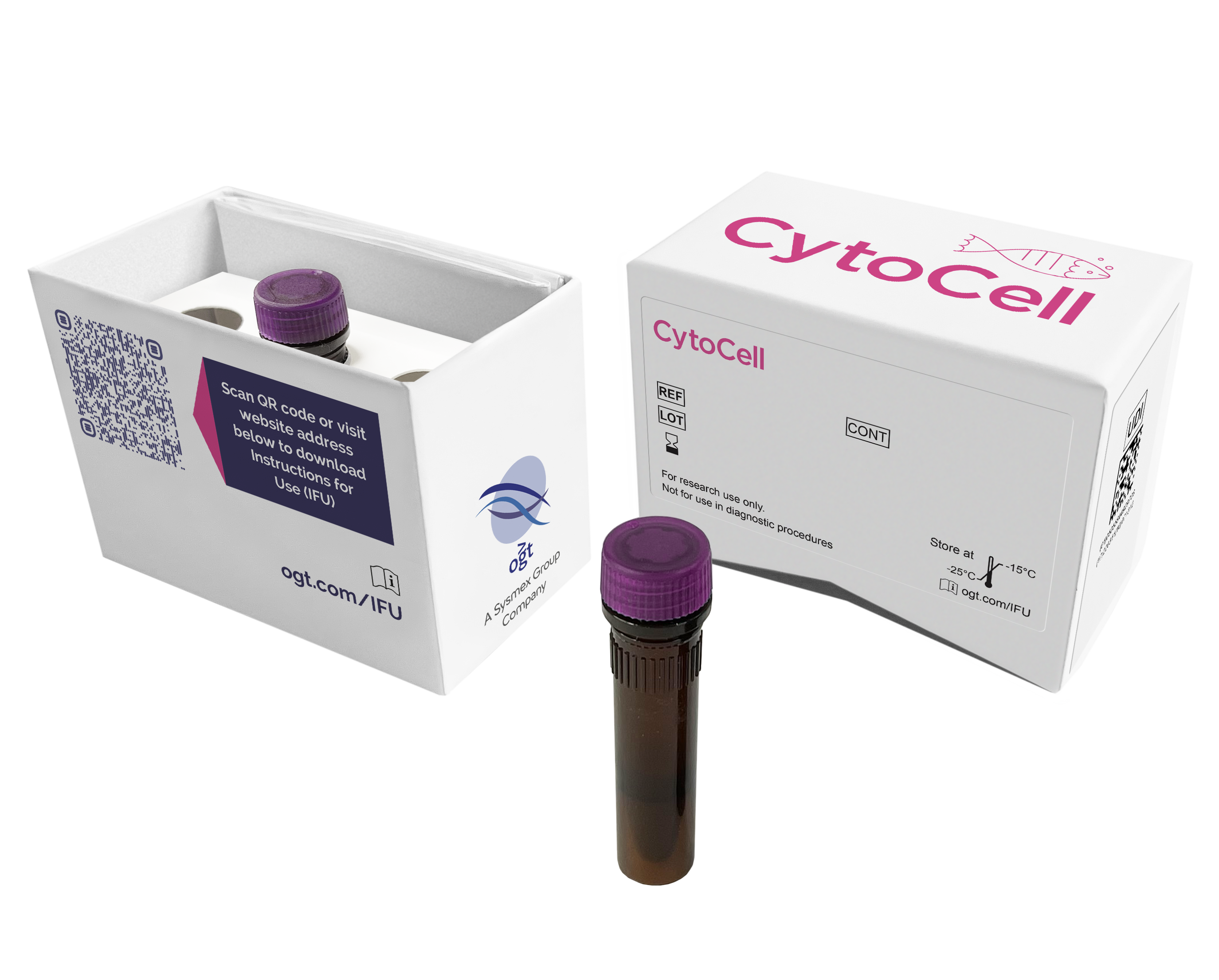
The CTNND2 probe is 159kb, labelled in red and covers a region including the D5S2883 marker. The UBE2QL1 probe is 193kb, labelled in green and covers a region including the D5S1637E and D5S2678 markers, as well as the entire UBE2QL1 gene. The SOTOS probe is 167kb, labelled in green and covers the NSD1 gene. The three unique sequences act as control probes for each other and allow identification of chromosome 5.
Cri-du-chat syndrome consists of multiple congenital anomalies, mental retardation, microcephaly, abnormal face and a mewing cry in infants. Cri-du-chat Syndrome is associated with deletions, which vary in size, of part of the short arm of chromosome 51.
The estimated prevalence varies between 1 in 20,000 to 1 in 50,000 births2, making it one of the more common deletion syndromes. A critical chromosomal region involved in the high-pitched cry has been mapped to the proximal part of chromosome band 5p15.33. The region involved in the remaining features of the syndrome has been mapped to 5p15.23,4,5.
SOTOS syndrome is a neurological disorder characterised by a distinctive facial appearance, overgrowth in childhood and developmental delay6. Malignant tumour formation has also been reportedly associated with SOTOS syndrome7.
NSD1, a gene encoding a histone methyltransferase, and implicated in chromatin regulation8, was identified as the gene disrupted by the 5q35 breakpoint in a patient carrying a chromosomal translocation9. Haploinsufficiency of the NSD1 gene appears to be the major cause of SOTOS syndrome.
In vitro diagnostic (IVD)
→ English/Français/Italiano/Deutsch/Español
→ Polski
Research use only (RUO)
Find certificate of analysis documentation for our CytoCell FISH probes
Our lab has been using a wide range of CytoCell FISH probes for a number of years, and have been increasing this range all the time. The probes have clear bright signals and show good reproducibility. CytoCell provides fast delivery of catalogue probes, and are very responsive when we have any queries or problems with their products.

Bridget Manasse
Addenbrookes Hospital, Cambridge University Hosiptals NHS Foundation Trust, UK
In our hands, CytoCell FISH probes have proven to be of the highest quality with bright, easy to interpret signals, thus providing confidence in our results. OGT's customer support is outstanding, as their staff are extremely knowledgeable and truly care about their customers and their customers’ needs.

Jennie Thurston
Director of Cytogenetics, Carolinas Pathology Group, USA
I first came across CytoCell FISH probes in a previous lab I worked in and I was struck by the quality of the products. Since this time, I have been recommending and introducing CytoCell probes across all application areas — now they are the primary FISH probes used in our lab. They have an excellent range of products and their ready-to-use reagent format saves considerable time.

Elizabeth Benner
Medical Technologist, University of Arizona Health Network, USA
We have been working with CytoCell fish probes for two decades because of their excellent clarity and intensity regardless of the size of the probe. It is so clear and simple to detect.
Dr. Marina Djurisic
Head of Laboratory of Medical Genetics, Mother and Child Health Care Institute of Serbia “Dr Vukan Cupic”, Serbia
The quality and consistency of CytoCell’s probes means I can trust the results, and my clients get their results in a timely manner.

Dr. Theresa C. Brown
Director, Cytogenetics Laboratory, Hayward Genetics Center, Tulane University School of Medicine, USA
It was very important for us to have more consistent results with our probes — easy-to-read bright signals and a range of vial sizes, which is much more cost-effective.

Janet Cowan, PhD
Director of the Cytogenetics Laboratory, Tufts Medical Center, USA
Not only do CytoCell offer an extensive range of high-quality FISH probes, the customer support is also excellent — providing fast access to all the probes I need. The probes are highly consistent with bright signals allowing easy scoring of results.
Dr. Eric Crawford
Senior Director, Genetics Associates Inc., USA
The quality and reproducibility of results using the CytoCell kit has been vital in accurately detecting co-deletions in our glioma investigations. We now have a cost-effective test that we can rely on that is also easy to use and interpret. We've been consistently impressed with this kit - not to mention the support offered by OGT's customer service, and have completely transitioned over to CytoCell probes.
Gavin Cuthbert, FRCPath
Head of Cancer Cytogenetics, Northern Genetics Servce, Newcastle, UK